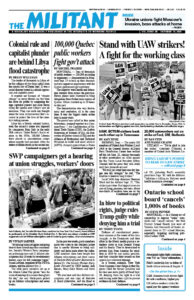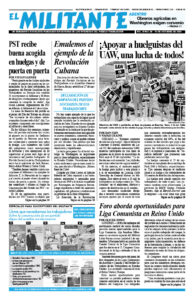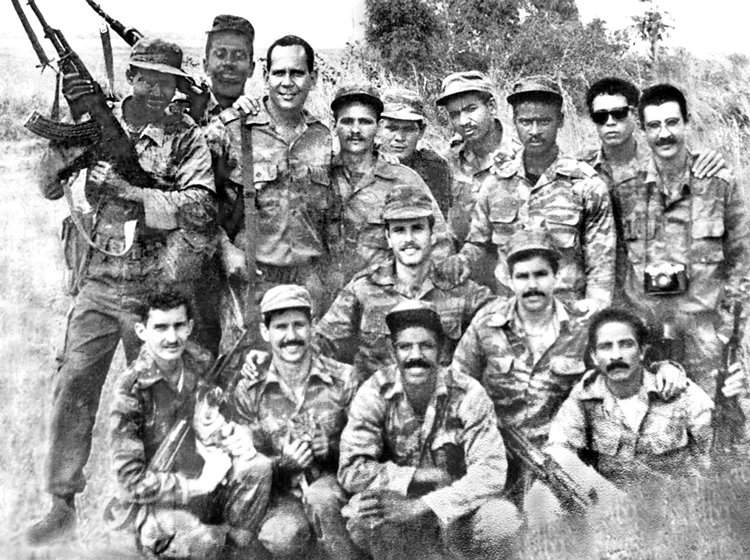One of Pathfinder’s Books of the Month for October is Cuba & Angola: The War for Freedom by Harry Villegas. Widely known as “Pombo,” he fought alongside Che Guevara in Cuba, the Congo and in Bolivia. Pombo helped lead Cuba’s volunteer military mission in Angola 1977-79, defending the newly independent country against invasion by the U.S.-backed apartheid regime of South Africa. From 1981 to 1988, until the South African forces were defeated, he served as liaison between Fidel Castro, Cuban commander-in-chief, and Cuba’s internationalist forces in Angola. The book is based on interviews with Villegas by Socialist Workers Party leader Mary-Alice Waters and others. Copyright © 2017 by Pathfinder Press. Reprinted by permission.
HARRY VILLEGAS: Fidel’s leadership was decisive in winning the victory. He was on top of everything, day in and day out. He went to the command post daily.
During the Cangamba battle, Polo spoke to the Commander every day at 7:00 p.m. by radio. I’ve described the foresight that Fidel demonstrated in that battle and the confidence he inspired in the troops. He was always concerned about the well-being of the combatants.
Che said Fidel’s greatness lay in the details. During the struggle in Angola, he wanted to see everything, touch everything, verify everything. …
Fidel always kept analyzing everything, the changing elements, and drew his conclusions. …
MARY-ALICE WATERS: The internationalist aid to Angola over a nearly sixteen-year period was an enormous effort for a relatively small and economically underdeveloped nation such as Cuba. Beginning in 1989, almost simultaneous with the end of the Angola mission, the disintegration of the Soviet bloc regimes led to the collapse of most of Cuba’s foreign trade agreements and many aid projects, sparking the severe economic crisis of the 1990s. Some Cubans express the view that the resources that went to help Angola should have been used at home.
VILLEGAS: Cuba’s aid to Angola was not only worthwhile, but if we were in a position to do it again, we would.
If the South African army had not been defeated in Angola, would apartheid have been eliminated when it was? If we did nothing more than indirectly help defeat apartheid, our effort was unquestionably worthwhile.
Thanks to the victory in Angola, the Namibian people won their independence.
Perhaps it was a dream of ours to think that socialism could be built in Angola. But South Africa was prevented from carving up and dominating Angola.
Whether or not the final objectives were achieved, these are glorious pages in the history of the peoples that have created the foundations for the future.
The internationalist mission in Angola strengthened us in every respect. But above all, I would say, in consciousness.
Angola exposed us to a reality very different from what we were familiar with in Cuba. We lived and struggled together with the Angolan people. We saw with our own eyes the legacy of centuries of colonialism and imperialism in Africa: hunger, disease, illiteracy, deep inequalities. The consequences of a system of exploitation that doesn’t value the life of ordinary people.
That experience enriched us. It allowed us to better understand everything we have achieved with the revolution. To understand that the values of the revolution are superior to those of capitalism, where “every man for himself” prevails.
Hundreds of thousands of Cubans proved capable of self-sacrifice, of acting on behalf of other human beings, of defending sister peoples against the apartheid regime.
All that strengthened us politically.
The generations that went through those experiences included three of our Five Heroes [the Cuban Five] — Gerardo, Fernando, and René — who later carried out an internationalist mission in the United States in defense of the revolution.
It was not only a learning experience for those who took part in the internationalist mission. When you know that your father or mother or grandfather went to Angola as a volunteer, thousands of kilometers away, without receiving a cent, and risked his or her life, you admire and learn from that example.
As Raúl [Castro] said, thanks to Angola, “all of us know much better what we are capable of achieving.” In the 1990s the experience of Angola helped us survive the hard years of the Special Period.
Today in Cuba we face big economic challenges. Without economic progress there can be no socialism. Our goal is to increase production of the means of subsistence, and to do it more efficiently. But above all else, we have to put human beings at the center of everything we do.
That’s what we did in Angola. We proved capable of giving all in exchange for nothing. Nothing but the satisfaction of having fulfilled our commitment to humanity.
That’s very important for the education of the new generations.
What Raúl said when our combatants returned from Angola in 1991 remains true today: “When we face new and unexpected challenges we will always be able to recall the epic of Angola with gratitude, because without Angola we would not be as strong as we are today.”
We defeated the South Africans with minimum casualties
In Cuito Cuanavale the South Africans really broke their teeth. And it all came about with a minimum of casualties — a minimum of casualties! — for our own forces, the Angolan and Cuban forces.
The main idea was to stop them at Cuito Cuanavale and deal them blows from the southwest. Enough troops were gathered to seriously threaten points of strategic importance for South Africa and strike hard at them on terrain that we, not the enemy, had chosen.
We not only sent our best pilots to Angola, we also sent our best antiaircraft weapons, a large amount of mobile antiaircraft equipment, a good quantity of antiaircraft missile artillery. We reinforced our air power and we sent as many tanks, armored troop carriers, and artillery pieces as were needed.
— Fidel Castro, Dec. 5, 1988


